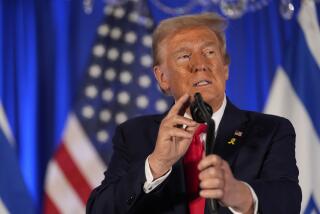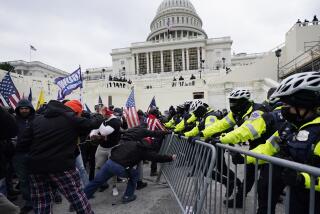White House does not dispute that FBI probe now includes at least one Trump aide
Reporting from Washington — President Trump told a pair of Russian envoys that his abrupt decision to fire FBI Director James B. Comey — whom he described as “crazy, a real nut job” — had relieved “great pressure” on him because of the Russia investigation, according to a published report.
Adding to Trump’s cascading legal and political woes, the FBI investigation reached directly into the White House for the first time Friday with a separate report that an unnamed Trump aide is under federal scrutiny as a person of significant interest.
The White House did not dispute either account, which created a new furor just as Trump was taking off from Andrews Air Force Base on his first official trip overseas, a nine-day visit to five countries in the Middle East and Europe.
Until now, the FBI probe was only known to be focused on whether members of Trump’s campaign or other associates had colluded with Russian intelligence to interfere with the 2016 presidential race.
The designation of a person of interest does not signal that criminal charges are imminent, or even likely, for one of Trump’s aides. But it does suggest the inquiry has moved into a new phase, one potentially far more damaging for the president since it now appears in his direct orbit.
The investigation, which began last July, clearly is accelerating. A federal grand jury in Virginia has issued subpoenas and the FBI is conducting interviews. On Wednesday, the Justice Department formally handed off the investigation to a special counsel, former FBI Director Robert S. Mueller III, to ensure its independence from White House pressure.
Comey agreed Friday to testify in public to the Senate Intelligence Committee after the Memorial Day holiday, according to a statement from the committee. He has told associates that he kept detailed memos of his conversations with Trump, including one in which he said the president told him to “let go” of an investigation.
Three other congressional panels — the House Intelligence Committee, the Senate Judiciary Committee and the House Oversight Committee — are conducting separate inquiries. Former CIA Director John Brennan is scheduled to testify Tuesday to the House Intelligence Committee.
The latest two accounts were first reported by the Washington Post and the New York Times.
The timing underscored that Trump will get no respite from the growing swirl of scandals he faces in Washington even as he meets dozens of heads of state in elaborate ceremonies and attends high-powered summits abroad.
Trump has repeatedly vented his frustration with the FBI investigation, denouncing it on Twitter this week as “the single greatest witch hunt of a politician in American history!”
The investigations are creating more political hurdles for Republican lawmakers, who fear the Trump tumult will torpedo their legislative agenda.
The Washington Post story did not identify who in the White House the FBI now considers a person of interest, although it said the individual is “someone close to the president.”
In a statement, White House Press Secretary Sean Spicer did not confirm or deny that a White House aide had been caught up in the FBI inquiry.
“As the President has stated before — a thorough investigation will confirm that there was no collusion between the campaign and any foreign entity,” Spicer said.
The Justice Department declined to comment. “As a matter of policy, we don’t comment on the existence or nonexistence of investigations or targets of investigations,” said spokeswoman Sarah Isgur Flores.
The New York Times cast a new light on Trump’s firing of Comey last week, a dismissal that sparked political turmoil when the White House issued a series of conflicting reasons.
The Times has read what was described as the official White House memo chronicling Trump’s meeting with Russia’s foreign minister, Sergei Lavrov, and its ambassador to the United States, Sergey Kislyak, in the Oval Office on May 10, the day after Comey was fired.
“I just fired the head of the F.B.I. He was crazy, a real nut job,” Trump told them, according to the Times. “I faced great pressure because of Russia. That’s taken off.”
That statement would appear to constitute Trump’s most direct admission that he fired the FBI director in an attempt to affect the investigation.
The top Democrat on the House Oversight Committee, Rep. Elijah E. Cummings of Maryland, called the reported conversation “extremely troubling.” He asked Chairman Jason Chaffetz (R-Utah) to subpoena the White House memo.
Some Republicans seemed equally astonished.
“Assuming it’s in context and assuming it’s accurate, it is a reckless thing for a president to say, particularly to Russian” officials, said Ari Fleischer, who routinely sat in on meetings with foreign dignitaries while serving as President George W. Bush’s press secretary.
“Did he really think dismissing Comey would get rid of the investigation?” Fleischer asked. “One, it doesn’t work like that. And two, it would be more than reckless if the president thought it worked like that, and that’s why he did it.”
Notes from Oval Office meetings and phone calls with foreign leaders are often written down by an aide in what are called MEMCONs, or memorandums of conversations. These are distributed over a classified computer system to senior officials or Cabinet members on a need-to-know basis. The memos can include quotes from the conversation.
Michael Allen, a former senior director on the National Security Council in the George W. Bush White House, said that transcripts of meetings with foreign leaders usually “are treated like the crown jewels.”
“This is an extraordinary release of what are intended to be private conversations,” Allen said.
In a statement Friday, Spicer did not deny the substance of the New York Times story. Instead, he suggested that Trump’s comment about easing “great pressure” on him referred to his ability to improve relations with Russia.
“The President has always emphasized the importance of making deals with Russia as it relates to Syria, Ukraine, defeating [Islamic State] and other key issues for the benefit and safety of the American people,” Spicer said.
Comey’s “grandstanding and politicizing the investigation” had “created unnecessary pressure on our ability to engage and negotiate with Russia,” Spicer said.
He added, “Once again, the real story is that our national security has been undermined by the leaking of private and highly classified conversations.”
The White House initially said Trump fired Comey because of a recommendation by Rod Rosenstein, the deputy attorney general.
Trump later told NBC News that he would have fired Comey regardless of a Justice Department recommendation and that he had the “Russia thing” on his mind when he made the decision.
Trump has said repeatedly that he is not personally under investigation. He repeated that to reporters Thursday, but left room for the possibility with other members of his administration or his campaign.
“There’s no collusion between, certainly, myself and my campaign — but I can always speak for myself — and the Russians — zero,” he said. He appeared to mean that he could “only” speak for himself.
The developments came as Rosenstein spent his second consecutive day on Capitol Hill delivering an extraordinary briefing for all House members on his decision to name a special counsel to take over the Russia inquiry.
Rosenstein told lawmakers that he knew Trump wanted to fire Comey before he wrote a memo to the president outlining his own concerns over Comey’s performance. The White House initially cited that memo as the reason Trump fired the FBI director.
“I wrote it. I believe it. I stand by it,” Rosenstein told lawmakers, according to text of his opening statement released publicly.
Rosenstein also disputed reports that Comey had asked for more staff and funding for the FBI investigation. “I am not aware of any such request,” he said.
The hourlong session captivated lawmakers, who packed the session, as senators did for Thursday’s all-Senate briefing.
Mueller’s appointment as special counsel has been widely praised by lawmakers in both parties, and many hope the investigation will begin to bring some answers to the chaos that has upended Trump’s White House.
Applause erupted when Rosenstein told lawmakers that his intent in naming Mueller was to restore Americans’ confidence in the political process.
“For the first time, there’s this willingness on this particular issue to jointly push back and to show a level of independence,” said Rep. Jackie Speier (D-Hillsborough), a member of the House Intelligence Committee.
“This will not be a partisan activity,” said Rep. Darrell Issa (R-Vista). “There was great consensus that going after the Russians for interference with our election is a nonpartisan or bipartisan issue.… This is about public confidence.”
Even Republican lawmakers who stand by the president seemed satisfied that Mueller would bring some stability to the questions circling the White House and the GOP.
Rep. Joe Wilson (R-S.C.) sides with Trump’s claim that the investigations are a “witch hunt,” but hopes Mueller’s inquiry can bring some answers. Rosenstein’s briefing, he said, “was reassuring.”
Times staff writers Brian Bennett and Joseph Tanfani contributed to this report.
ALSO
Trump wants a border wall, but few in Congress want to pay for it
With a push from Trump, House Republicans pass Obamacare overhaul
More coverage of politics and the White House
UPDATES:
4:50 p.m.: This story has been updated with the latest developments, including Comey agreeing to testify.
This story was originally published at 2:15 p.m.
More to Read
Get the L.A. Times Politics newsletter
Deeply reported insights into legislation, politics and policy from Sacramento, Washington and beyond. In your inbox three times per week.
You may occasionally receive promotional content from the Los Angeles Times.












